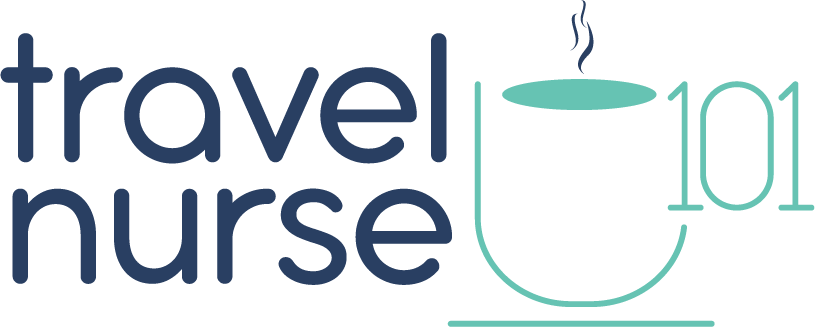You’ve decided to take the leap and submit your application to be a travel nurse! I am here to tell you this will be one of the best decisions you could make! Now, what happens from here? Let me break down the travel nurse process for you.
Your Relationship with Your Recruiter
You’ll want to build and maintain a solid, professional relationship with your recruiter. Honest and open communication with your recruiter is the key to your success, so be upfront about your intentions, goals, must-haves, deal-breakers, and when you’re unavailable for a job. They are there to help you land your dream assignments!
It typically takes about three to four weeks (or more) for your recruiter to get you on your first assignment because of the onboarding requirements you’ll need to complete. Have time dedicated to completing medical requirements, like getting up-to-date vaccinations, and plan to have access to a computer to keep in communication with your recruiter. Most companies can almost always guarantee you a job, but it depends on your flexibility regarding locations, shifts, time off, pay, etc.
Applying for the Job
Next, you get to build your nurse profile with your recruiter and get it ready for travel nurse openings! Before submitting your application for a job, your recruiter should send you all of the specifics of the assignment, including the hospital and unit, shift, start and end dates, pay rates, and stipends. Your company and recruiter should always have your permission before submitting you for a job. My rule of thumb is only to submit to jobs that you are ready to accept. For this reason, you’ll want to know as much as you can about each position before you get to the interview.
Once submitted to a job, you should hear back within a few days to a week if you will have an interview or if the position has been filled. I was recently contacted within hours after submitting to a job, but it usually takes a few days. Still, have your phone on you and be ready to answer the call when it comes, even evenings and weekends. Many nurse managers will move to the next person if you don’t answer, and by the time you call them back, they could have already found a desirable candidate. Unfortunately, it is kind of a first-come, first-served since they have positions that need to be filled quickly.
Your Interview
Once you’ve submitted for a job, you should be prepared for a hospital interview. Don’t stress too much about this! The nurse managers have already seen your profile and have a good inclination you are qualified for the job. Your interview is your opportunity to show the hospital manager your strong qualities, what you’re excited about, and what your uniqueness can bring to their facility! Here are some helpful dos and don’ts for the hospital interview as you prepare.
Do
- Make sure you get your interviewer’s contact info so you can send a follow-up email briefly explaining everything you have discussed.
- Remember that you are interviewing the hospital just as much as they are interviewing you.
- Make sure to discuss any time off needed during your assignment with the manager.
Don’t
- Do not ask the facility about pay. The facility has no control over pay packages.
- Do not forget to let your recruiter know if you are interested in the position. They can move your application along for you!
Congratulations, you’ve now verbally accepted the job!
Your Contract
Next comes the contract. You need to take time and go over your contract with a fine-tooth comb. You want to understand every piece of it. If you have questions about your contract, get your answers before signing it.
Your travel nurse contract should have the dates of the contract a breakdown of your pay (including hourly taxable rate, stipends, overtime rate, holiday rate, and what holidays are recognized for holiday pay). It should detail the units where you can float, how many hours a facility can call you off, and on-call shifts if required. Any personal time off approved by the manager should also be included. Reimbursements, such as license and travel expenses, must also be in your contract.
Your contract is a legally binding document and should be treated as such. It can also be your saving grace if you’re asked to do something that isn’t in your contract and is out of your comfort level. Keep a copy of it for quick access!
Once you sign your contract, you are ready to move forward in the travel nurse process!
Housing
Now, it is time to start thinking about housing for your assignment. Some travel nurse companies have a department dedicated to housing. If your travel nurse company offers housing stipends, you can also take those to find your own housing using Furnished Finder, Airbnb, VRBO, or Facebook housing pages for travelers. I traveled with my two dogs, so I usually found my own housing to ensure I’d have a place with a small yard for them.
QA
You will work with your company’s QA specialist very closely in the next steps to get all of your credentialing, background screening, drug testing, and onboarding requirements fulfilled. There will likely be some testing and compliance modules to complete, which differ from each facility. This is often the least enticing part of the whole travel nurse process, but it will be worth your while to get it done ASAP, so your start date isn’t delayed. After all the compliance and testing are completed, you will be cleared by your company to start. Mentor tip: I suggest waiting for that final clearance before traveling to your assignment.
Your First Assignment
You can expect to get your first-day instructions for your assignment by the Friday afternoon before your start date if you are starting on a Monday. Typically, your first week includes orientation of the hospital, getting your badge and login credentials, computer training, possibly more compliance modules, and likely two to three shifts in the unit. However, this can vary, so it is good to ask the manager about this during your interview. I encourage you to find an opportunity to meet your leadership team during that first week because if you have any issues or concerns later, they will be able to put a face with your name.
Your Next Assignment
About a month into your assignment, conversations with you and your recruiter will begin about where you’d like to travel next, which can be a good motivator! Hospitals sometimes offer you to renew your contract, allowing you to extend your stay at that facility. Extension offers usually occur in the last four to five weeks of your assignment. Still, if you’re interested in staying on longer, you should talk to your unit manager and recruiter sooner rather than later. You don’t have to wait to be approached by the facility.
You now have almost completed your first travel assignment – congrats!! Getting this first one behind you will open up many more opportunities for you moving forward!



1 Comment
Jessica
Great info, thank you!!